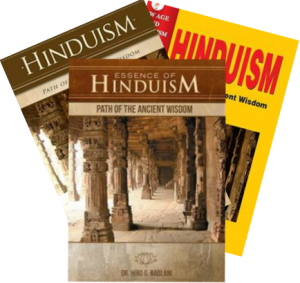In Hindu scriptures, terms like “consciousness,” “divine wisdom,” “Brahman,” and many others are liberally used. These words convey nearly the same meaning in common use, but they have remained somewhat abstract for majority of the people. As Pure Consciousness, God is the manifest primal substance, as infinite intelligence and power. There is a new science view now, drawing from quantum physics, which concludes that it not the brain that creates consciousness, but consciousness that creates the brain. The view gives credence to the survival of soul afer death, and has deep roots in Indian metaphyics.
Hindu sages realized God or the Divine as a phenomenon either without any form (nirguna) or as manifesting in various forms (saguna). They realized that there is but one Divine for all beings, as well as for the nonbeings. It is immanent, transcendental, and universal and is present in all places in the entire cosmos. The sum total of all energy and consciousness is perceived as God. Hindus believe different names of gods are merely icons in the infinite divine spectrum.
According to Hindu philosophy, “consciousness” is primarily inactive (purusha). This comes in contact with the active component called the prakruti–the primordial materiality of nature.
Human beings are born with three basic characters of nature called the gunas:
Sattivic, which represents purity
Rajasic, which represents activity
Tamsic, which represents dullness or inertia
These three are the basic characteristics or gunas of all beings and determine the nature of actions performed during the lifetime. According to Hindu theology, human beings alone have the capacity to alter these gunas or the basic attitudes by using the free will. The transformation of the gunas is indeed the main task of all human life. According to Hindu philosophy, this task may not be accomplished in one lifetime; rather, it may evolve through eons of birth cycles. The consciousness, or the divine power, although inactive by itself, is the life force behind all activity. It has been compared to the energy of electricity, which is the moving force behind all tools and gadgets. The transformation of the inner being, or antahkaran, has been considered as the most prized pursuit of human life. From the lowest quality of the tamas, the dull and evil attitude, toward the rajasic, the active and productive trait, and further to the sattvic nature of purity and benevolence are the gradual evolutionary steps for the soul of the individual, until finally it attains the highest perfection, the super-consciousness of the Divine, and merges itself into the Divine, losing its separate individuality. This is the stage of salvation, or moksha, of the soul from the recurring birth and death cycles, known as samsara.
This internal transformation is attained by meditation and spiritual practices sadhana. Spiritually exalted persons gradually identify themselves more with the soul, atman, than with the body. Intense and sustained mental concentration on higher spiritual thoughts liberates them from any physical afflictions. Indeed, in Hindu thought, over-identification with the physical body and other material possessions is considered to be the root of all human suffering.
Hindu seers often compare this communion with the spiritual consciousness to the deep leap of a diver who swims to the ocean depths in search of pearls. The pearl is the Divine wisdom. Time and again, Hindu sages have advised to look within one’s own self and discover the Divine. Hindu philosophy asserts that when the mind is pure and applies concentrated attention, it may attain spiritual knowledge, or jnana, and one may discern what is not normally perceptible to the senses. In Hindu philosophy, this Divine consciousness, the Divine, and God are essentially one and the same thing.
Albeit the concepts of Soul, Consciousness, etc. are firmly believed and accepted in Hindu philosophy, they still remain rather unresolved by modern science. These metaphysical spiritual concepts lie beyond the current paradigms of science. Even so, several other Hindu views and philosophies like “vegetarianism”, “environment protection”, “meditation” etc. are being gradually embraced and respected by the world at large. There is a great possibility that further advancement in technologies may indeed uncover scientific clues to these unresolved metaphysical secrets of Hinduism.




